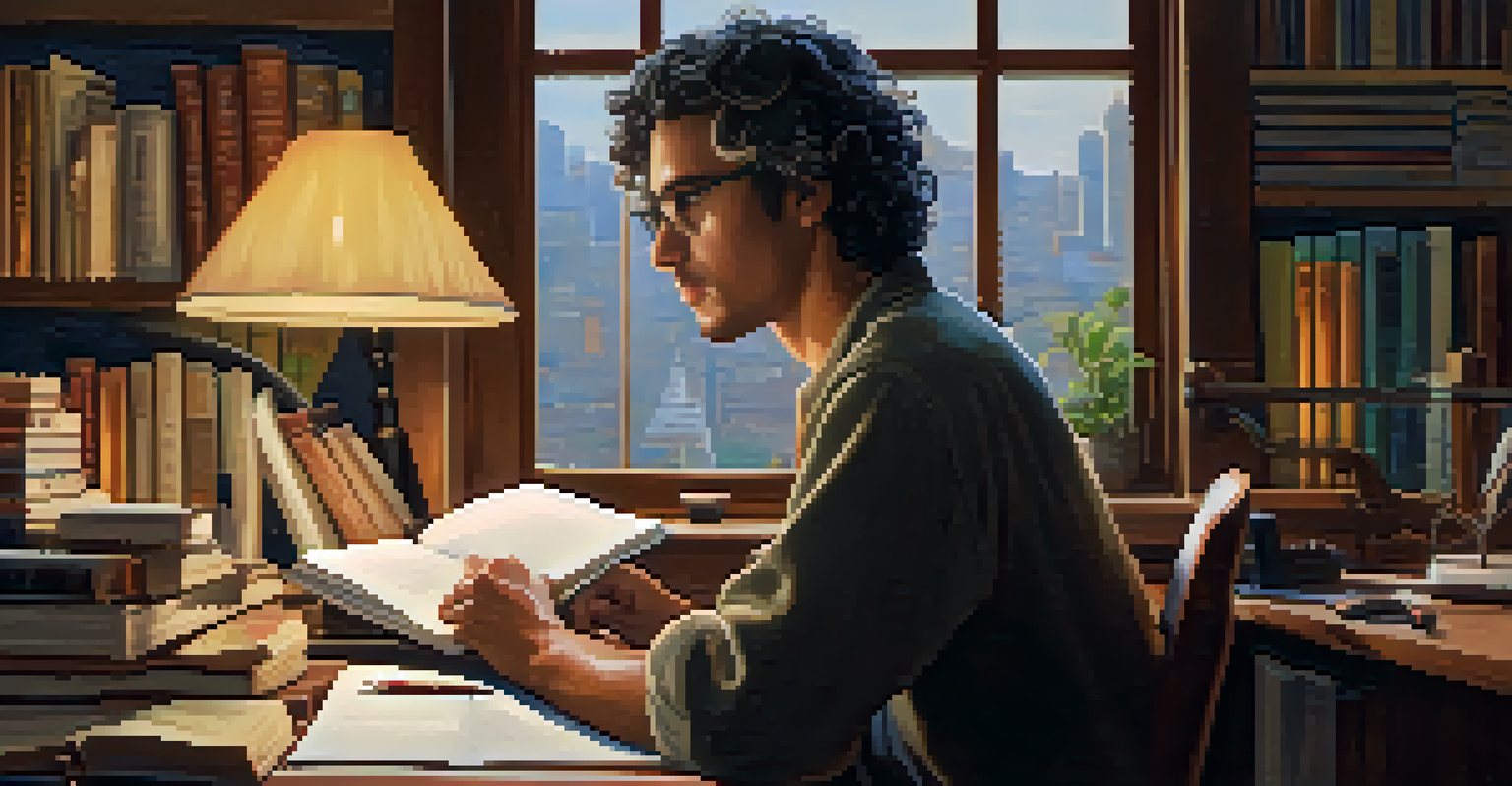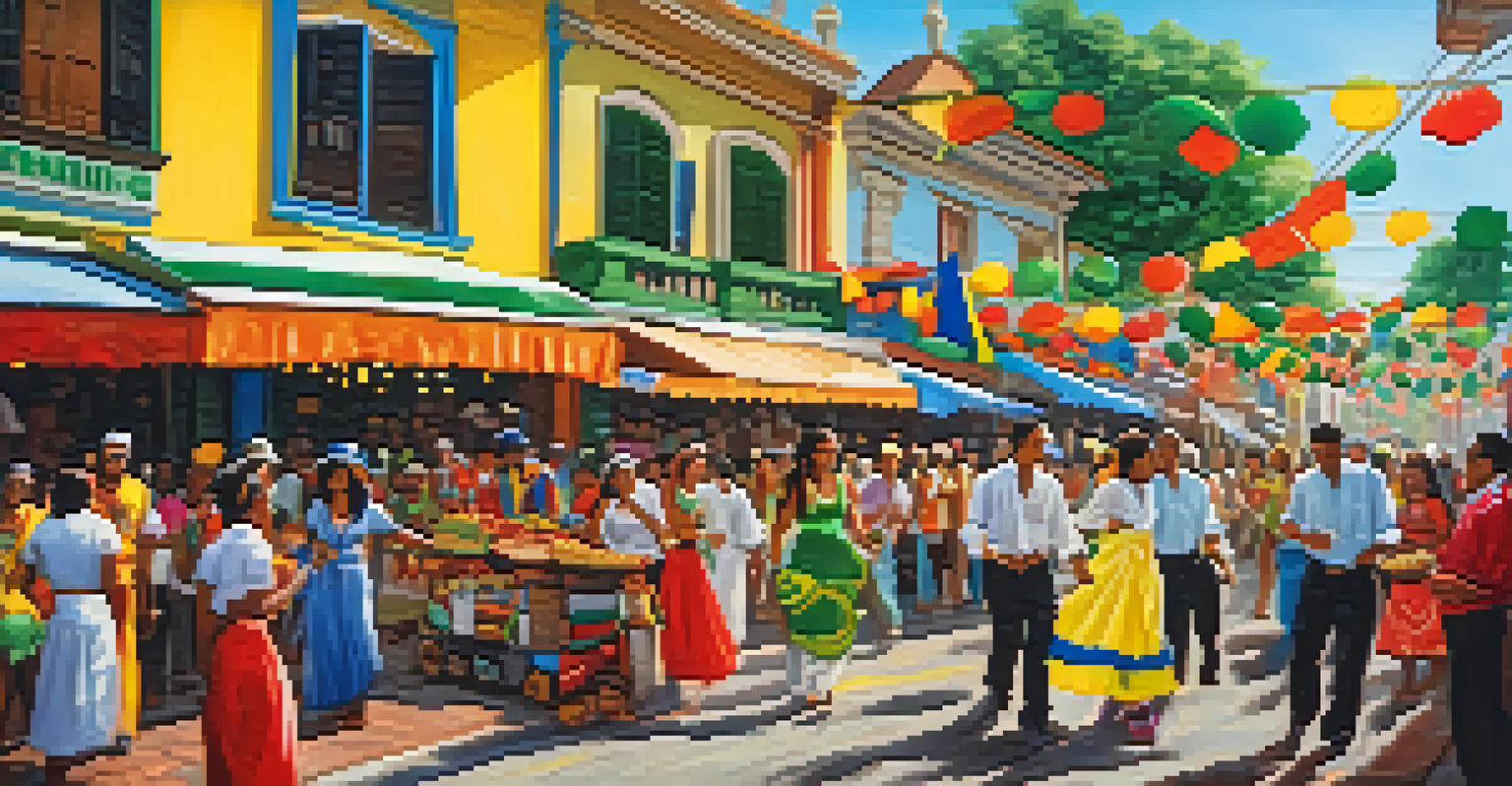Exploring the Richness of Brazilian Literature: A Journey

The Historical Roots of Brazilian Literature
Brazilian literature has a rich history that intertwines with the country's colonial past. It began to take shape in the 16th century with the arrival of Portuguese explorers, who brought their literary traditions with them. This fusion of cultures laid the groundwork for a unique literary identity that reflects Brazil's diverse society.
Literature is the most agreeable way of ignoring life.
Throughout the years, Brazilian writers have drawn inspiration from their surroundings, creating a literary landscape that mirrors the nation's complexities. From the struggles of indigenous peoples to the impacts of slavery, these themes have shaped the narratives that define Brazilian literature. Just like the country itself, the literature is a melting pot of influences.
As we explore this history, we can see how each era contributed to the evolution of Brazilian literature, paving the way for the voices that would later emerge. Understanding these roots helps us appreciate the depth and richness of contemporary Brazilian works, making it clear that literature is not just art; it's a reflection of cultural identity.
Key Movements and Their Influence
Brazilian literature has undergone various movements, each leaving an indelible mark on its landscape. The Romantic period, for instance, celebrated Brazilian nature and nationalism, showcasing the beauty of the vast landscapes. Authors like José de Alencar helped define a sense of Brazilian identity through their works, making literature a vessel for national pride.

Then came Modernism, a movement that challenged traditional forms and embraced innovation. Writers like Mário de Andrade sought to break free from European influences, incorporating local dialects and themes into their works. This shift not only transformed literature but also sparked a broader cultural awakening, encouraging Brazilians to explore their own voices.
Brazilian Literature's Diverse Roots
Brazilian literature reflects its colonial past and cultural diversity, shaped by the influences of indigenous peoples and the legacy of slavery.
As we navigate through these movements, we can see the evolution of style and thought in Brazilian literature. Each transition reflects the changing socio-political landscape, making the literary journey a fascinating mirror of Brazil's history.
Celebrating Diverse Voices in Literature
One of the most captivating aspects of Brazilian literature is its diversity. Writers from various backgrounds, including Afro-Brazilian, indigenous, and immigrant perspectives, contribute to a rich tapestry of narratives. This multiplicity of voices provides readers with a more holistic understanding of Brazilian culture and society.
The author is a creator of worlds; he is a magician who creates the reality he wishes, he creates a world that will be his mirror.
Authors like Conceição Evaristo and Milton Hatoum explore themes of identity, race, and belonging, showcasing the intricacies of life in Brazil. Their works not only highlight personal stories but also address broader social issues, encouraging readers to reflect on their own experiences and perspectives. It’s like listening to a symphony where each instrument plays a crucial role in creating harmony.
By celebrating these diverse voices, Brazilian literature fosters inclusivity and empathy, inviting readers to engage with different experiences. This diversity enriches the literary landscape, making it a vibrant space for exploration and connection.
The Role of Brazilian Folklore in Literature
Brazilian folklore plays a significant role in shaping the country's literary identity. Folklore is the collection of myths, legends, and traditions passed down through generations, and it reflects the cultural heritage of Brazil. Writers frequently draw on these stories, weaving them into their narratives to create a sense of belonging and continuity.
For instance, João Guimarães Rosa’s works often incorporate elements of folklore, blending them with modern themes. His unique storytelling style captures the essence of Brazil’s rural landscapes and the lives of its people, making folklore a living part of the narrative. It’s like a bridge connecting past and present, allowing readers to engage with history in a meaningful way.
Social Commentary in Literature
Many Brazilian authors use their writing to confront social issues like inequality and human rights, prompting readers to engage with these realities.
By integrating folklore into literature, Brazilian authors not only preserve cultural traditions but also highlight their relevance in contemporary society. This connection enriches the reading experience, inviting readers to explore the depths of Brazil's cultural heritage.
Brazilian Literature and Social Commentary
Many Brazilian authors use their works as a platform for social commentary, addressing pressing issues such as inequality, corruption, and human rights. Literature becomes a powerful tool for critique and reflection, enabling writers to challenge the status quo. This commitment to social justice is evident in the works of authors like Jorge Amado and Machado de Assis.
Through their stories, these writers shine a light on the struggles faced by marginalized communities, urging readers to consider the realities of life in Brazil. Their narratives often serve as a call to action, encouraging readers to engage with the world around them. It’s a reminder that literature can ignite change, much like a single spark can light a fire.
By examining these social themes, readers can gain insight into the complexities of Brazilian society. This aspect of literature not only informs but also inspires, making it an essential part of the literary journey.
Contemporary Brazilian Literature: A New Wave
In recent years, contemporary Brazilian literature has gained international recognition, showcasing a new wave of talent. Writers like Adriana Lisboa and Julián Fuks are redefining the literary landscape with their innovative storytelling and unique perspectives. Their works often explore themes of displacement, belonging, and identity, resonating with readers both in Brazil and beyond.
This new generation of authors is also using diverse mediums, from poetry to graphic novels, to express their experiences. This experimentation not only broadens the appeal of Brazilian literature but also invites younger audiences to engage with the narratives. It’s like a fresh breeze, bringing new life and energy to a rich tradition.
Emerging Contemporary Voices
A new generation of Brazilian writers is gaining international acclaim, exploring themes of identity and belonging through innovative storytelling.
As we delve into contemporary works, we witness the evolution of Brazilian literature, adapting to the ever-changing global landscape. This dynamic scene reflects the resilience and creativity of Brazilian writers, ensuring that their voices continue to be heard and celebrated.
The Global Impact of Brazilian Literature
Brazilian literature has transcended borders, captivating readers around the world. Translations of works by authors like Clarice Lispector and Jorge Amado have introduced international audiences to the rich narratives and cultural insights of Brazil. This global reach not only highlights the talent of Brazilian writers but also fosters cross-cultural exchange.
As readers from different backgrounds engage with these stories, they gain a deeper understanding of Brazilian culture and its complexities. Literature becomes a bridge, connecting people across geographical and cultural divides. It’s like sharing a meal, where each dish tells a story and invites dialogue.

The global impact of Brazilian literature is a testament to its relevance and resonance, demonstrating that stories can unite us in our shared humanity. By exploring these narratives, readers can embark on their own journey of discovery, finding connections that transcend distance.